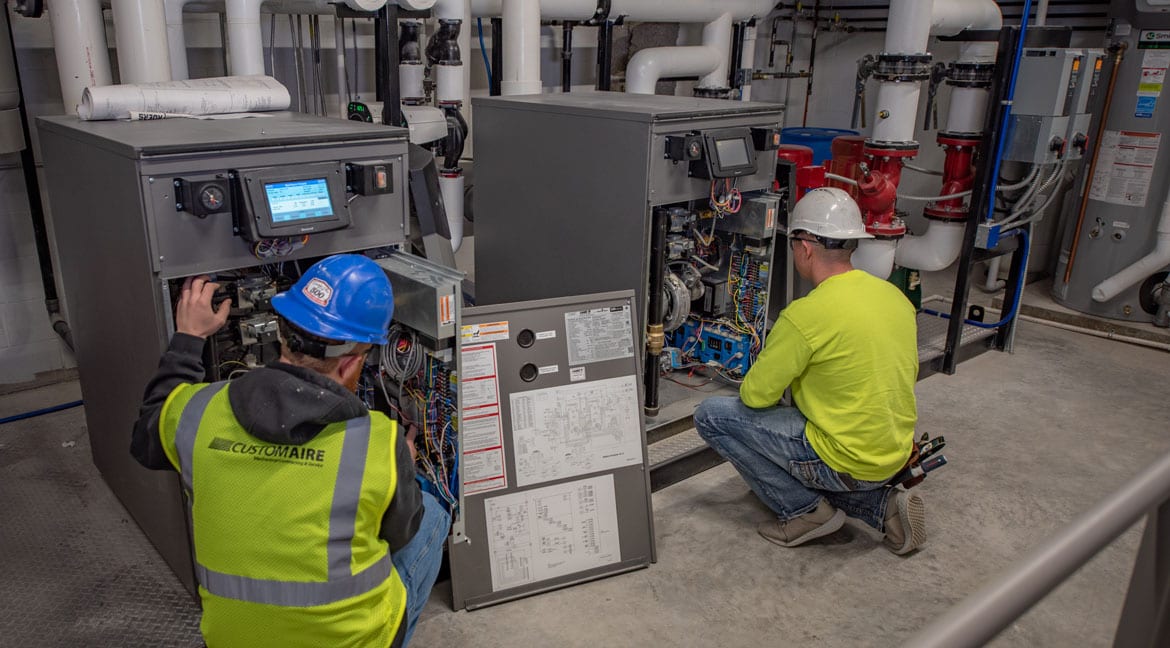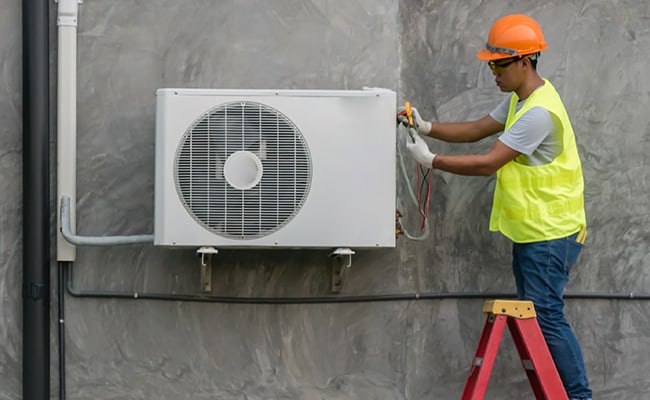Exploring the Providers Used for Installing a Heatpump and Furnace in Your HVAC Arrangement
When thinking about a new heating option, property owners frequently encounter the decision between warmth pumps and heating systems - furnace replacement. Each system has distinct advantages and disadvantages. Specialist setup plays a crucial duty in guaranteeing perfect efficiency and longevity of the devices. Understanding the nuances of the installment process can affect the performance of your a/c configuration. What particular solutions can enhance the setup experience and warranty efficiency? The responses might amaze you
Recognizing Heat Pumps and Furnaces: Key Differences
Heatpump and furnaces serve the crucial function of regulating indoor temperature levels, yet they operate fundamentally different concepts. Heating systems create heat by shedding gas, such as all-natural gas or oil, or by utilizing power to warm air. This heated air is after that dispersed throughout the home through ductwork. In contrast, warm pumps move warmth from one location to another, commonly removing heat from the outdoors air or ground, also in cooler temperature levels. This makes them an energy-efficient alternative for both heating and cooling.While heating systems are normally extra efficient in extremely cold climates, heat pumps can offer year-round temperature control, adapting to seasonal modifications. The setup demands likewise differ, as furnaces necessitate ventilation systems for exhaust gases, whereas heat pumps require space for outdoor systems. Comprehending these differences is important for property owners examining their home heating and cooling choices.
Benefits of Installing a Heatpump
Choosing to install a warmth pump supplies a number of advantages that can enhance home comfort and power effectiveness. Warm pumps offer both home heating and cooling down options, making them flexible for year-round climate control. Their capacity to move heat as opposed to produce it results in reduced energy usage, which can result in significant financial savings on energy bills.Additionally, heatpump run quietly compared to typical heating unit, adding to a much more relaxed home atmosphere. They also need less upkeep, as they have less moving components and do not rely upon combustion processes.Moreover, warmth pumps are environmentally friendly, as they use renewable resource sources, minimizing greenhouse gas discharges. Their installation might qualify house owners for energy efficiency refunds or tax motivations, even more improving the economic benefits. On the whole, heatpump stand for an effective, eco-conscious option for modern cooling and heating systems, guaranteeing convenience and sustainability.
Advantages of a High-Efficiency Furnace
A high-efficiency heating system provides significant power financial savings, which can result in minimized utility bills for homeowners. In addition, these systems contribute to a lower ecological impact by using less gas and launching fewer discharges. Boosted convenience levels are also an essential advantage, as these heaters maintain more constant temperature levels throughout the home.
Power Savings Possible
While several property owners look for methods to lower power bills, purchasing a high-efficiency heater can greatly enhance power cost savings. These heaters make use of innovative technology to transform a greater percentage of fuel into functional warm, significantly enhancing power performance. With a Yearly Gas Use Efficiency (AFUE) score often surpassing 90%, high-efficiency models can save house owners considerable amounts on their heating costs contrasted to common devices. Furthermore, they operate much more quietly and require less constant fixings, which can better add to overall cost savings. Over time, the initial financial investment in a high-efficiency heating system commonly repays via minimized energy expenses, making it an economically clever selection for those seeking to optimize their HVAC systems.
Environmental Impact Decrease
Buying a high-efficiency furnace not just benefits home owners economically but also considerably lowers ecological effect. These heaters operate with boosted power effectiveness, which equates to decrease greenhouse gas discharges. By consuming less energy, they lower reliance on nonrenewable fuel sources, adding to a decrease in air contamination and aiding combat environment adjustment. Furthermore, high-efficiency versions typically make use of advanced innovation that minimizes waste, further boosting their ecological benefits. The shift to such systems lines up with international efforts to promote sustainability, motivating a relocation in the direction of renewable resource resources. Consequently, property owners play an essential duty in fostering a healthier world while delighting in the benefits of decreased power prices and improved operational effectiveness. Such choices reflect a dedication to ecological stewardship and liable source monitoring.
Improved Convenience Degrees
High-efficiency heaters substantially improve convenience levels in property areas by preserving a lot more constant temperatures throughout the home. Unlike traditional models, these advanced systems make use of variable-speed blowers and regulating gas shutoffs, enabling precise temperature level changes. This modern technology lessens temperature fluctuations, guaranteeing that each room remains evenly comfy. Additionally, high-efficiency heaters run quietly, adding to a serene interior atmosphere. They likewise improve interior air high quality by utilizing sophisticated filtering systems that capture dirt and allergens, providing cleaner air for owners. In addition, their energy-efficient procedure minimizes energy expenses, making them an economical option in the future. Generally, high-efficiency heating systems not only advertise a comfy ambience but additionally improve the total living experience within the home.
Expert Installment Services: What to Anticipate
What can property owners anticipate during the expert installation of a heatpump and furnace? At first, a thorough evaluation of the home's home heating needs will certainly be conducted by qualified professionals. This analysis guarantees the proper sizing of the tools, adding to energy performance and optimal performance.Once the assessment is total, the service technicians will certainly schedule a setup day, preparing the site for the new system. Property owners can expect a thorough installment process that includes establishing the heatpump and heater, attaching necessary find more information ductwork, and ensuring correct electric connections.Technicians will certainly also check the refrigerant levels and evaluate the system for leaks, making sure whatever runs seamlessly. House owners must anticipate clear interaction throughout the process, with specialists clarifying each action and resolving any kind of inquiries. After installment, a demonstration of the new system's operation will be provided, ensuring homeowners recognize just how to use their new heating solution effectively.
Routine Maintenance for Optimal Performance
After the specialist installment of a warm pump and heating system, routine maintenance comes to be crucial for making certain peak efficiency. This maintenance commonly consists of routine examinations and this hyperlink maintenance to identify possible concerns before they escalate. Specialists often inspect the filters, guaranteeing they are tidy and replaced as essential, as filthy filters can hinder air movement and efficiency.Additionally, inspecting refrigerant degrees and guaranteeing electrical links are secure is essential for functional safety and performance. Regular maintenance might likewise involve cleansing the outside unit of the warmth pump to stop particles build-up, which can impact performance.Moreover, scheduling yearly tune-ups assists to extend the lifespan of the tools and preserve power efficiency. Homeowners are urged to maintain records of upkeep activities, as this paperwork can help in identifying patterns and making sure prompt actions. Routine upkeep not just improves comfort however also enhances energy intake, resulting in set you back financial savings in time.
Fixing Usual Heating And Cooling Issues
Several property owners come across usual HVAC issues that can interrupt convenience and efficiency. One prevalent problem is insufficient heating or cooling, often brought on by filthy filters, blocked ducts, or malfunctioning thermostats. An easy check of the air filter can deal with air movement issues, while blocked vents need to be navigate here removed for peak performance.Another regular concern is uncommon noises, which might suggest loose parts or mechanical wear. House owners ought to pay attention for rattles or squeaks and investigate without delay to avoid more damages. In addition, constant cycling can indicate that the system is large or that a thermostat calibration is needed.Finally, refrigerant leaks in heat pumps can lead to reduced efficiency and needs to be dealt with by an expert. Fixing these usual problems can help in preserving a comfortable indoor environment while expanding the life of the cooling and heating system. Looking for expert assistance when necessary guarantees that these issues are settled properly and safely.
Cost Considerations for Warmth Pump and Furnace Installation

Often Asked Questions
The length of time Does It Take to Mount a Warm Pump or Heater?
The setup period for a warm pump or furnace commonly ranges in between 4 to eight hours, depending upon the complexity of the system, existing facilities, and the experience of the installation group associated with the procedure.
Are There Funding Options Available for Heating And Cooling Installations?
Funding choices for HVAC setups vary by copyright, typically including versatile settlement plans, loans, or credit rating alternatives. Homeowners can check out these choices to handle expenses properly, guaranteeing convenience upgrades align with their monetary restraints.
What Allows Are Needed for Heatpump and Heater Installation?
The required licenses for warmth pump and furnace installation usually consist of structure, electrical, and mechanical licenses. Regional guidelines may determine details requirements, so speaking with the neighborhood authority assurances compliance and helps with a smoother setup procedure.
Can I Mount a Warmth Pump or Heater Myself?
The inquiry of self-installation for a heatpump or furnace occurs often. Normally, it is a good idea to get in touch with specialists to assure safety and security, conformity with regulations, and perfect performance, as improper installment can bring about substantial concerns.

What Guarantees Are Generally Offered on Setups?
Warranties on installments typically differ by professional and tools. Usually, they may consist of minimal lifetime warranties on components, one to five-year labor assurances, and details protection for the system's performance and performance, mirroring sector requirements. In comparison, warm pumps move heat from one place to an additional, often extracting heat from the outdoors air or ground, even in cooler temperatures. Their capacity to transfer warm rather than produce it results in reduced power consumption, which can lead to considerable financial savings on utility bills.Additionally, warm pumps run silently contrasted to conventional home heating systems, adding to a more serene home setting. What can homeowners expect throughout the expert installment of a warm pump and heater? Property owners can anticipate a careful installation procedure that includes setting up the warmth pump and heating system, connecting needed ductwork, and ensuring proper electrical connections.Technicians will also check the refrigerant degrees and examine the system for leakages, guaranteeing whatever operates seamlessly. When thinking about Cooling and heating upgrades, specifically the installation of a heat pump or heating system, comprehending the connected expenses is important for house owners.